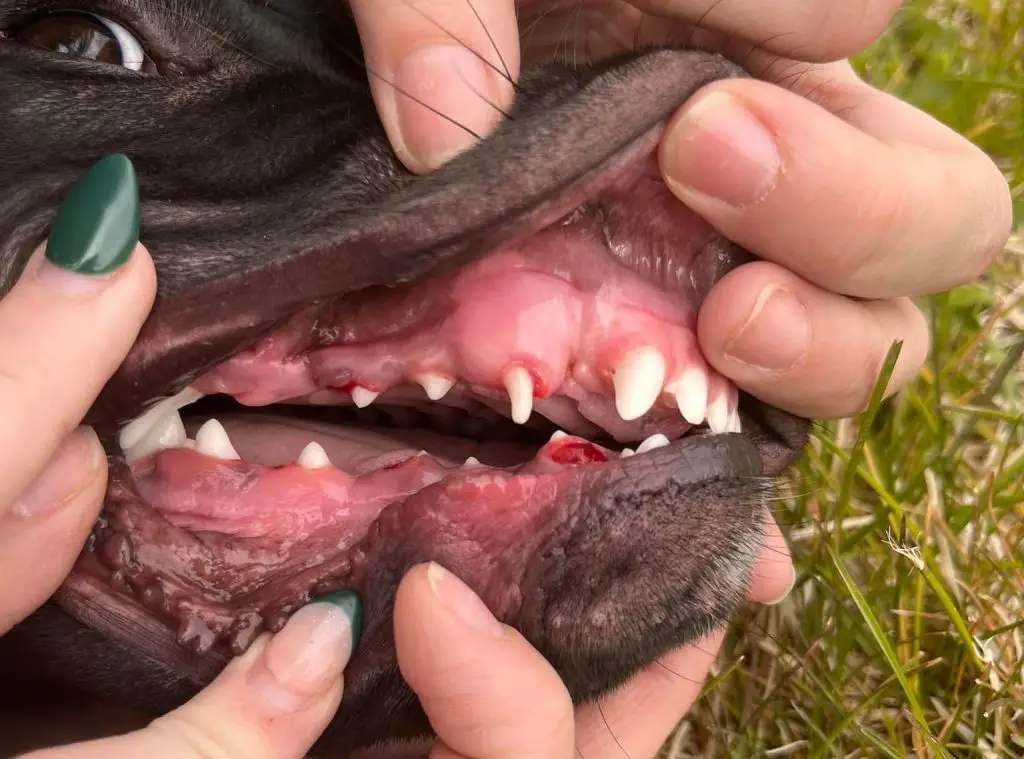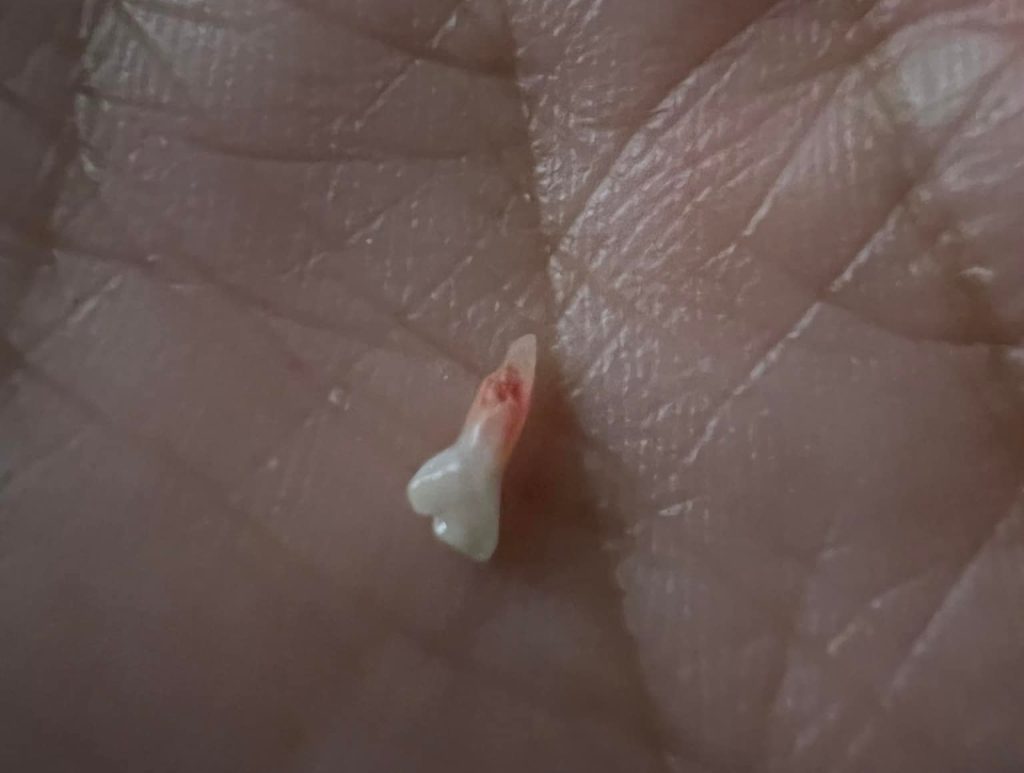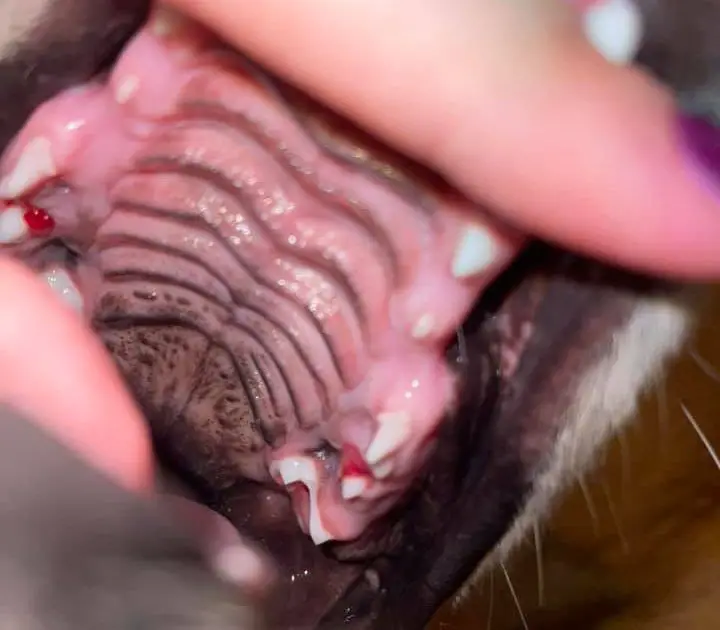If your puppy has just lost multiple teeth in one day, you may be wondering if this is normal. While losing teeth is a natural process for puppies, it can still be worrying for pet parents.
In this blog post, we will discuss what can cause a puppy to lose multiple teeth, and what you should do if it happens to your pet.
- What Is Teething In Dogs?
- Is It Normal For My Puppy To Lose Multiple Teeth In One Day
- What Are The Different Stages Of Teething In Puppies?
- Do Puppies Lose Their Baby Teeth All At Once?
- How Many Puppy Teeth Fall Out At Once?
- Why Is My Puppy Losing So Many Teeth?
- Can Losing Multiple Teeth In a Day Be a Sign of a Problem?
- How To Help a Teething Puppy
- In Conclusion
It is perfectly normal for a puppy to lose multiple teeth in one day as part of their natural teething process.
What Is Teething In Dogs?
Teething in dogs is the natural process of baby teeth being replaced by adult teeth.
Puppies typically begin teething at around three weeks old, with new adult teeth starting to come in behind their deciduous or “baby” teeth at around six weeks old.
During this time, puppies may be uncomfortable and chew on objects to relieve the soreness in their gums.
By 12 weeks old, all of a puppy’s adult teeth should be present – at which point teething will have finished and they will no longer experience discomfort from it.
Is It Normal For My Puppy To Lose Multiple Teeth In One Day

It is normal for a puppy to lose multiple teeth in one day. Puppies are born with a full set of baby teeth, which they start to lose around four months of age. By seven or eight months, most puppies have lost all their baby teeth and have their adult teeth.
Losing multiple teeth in one day is nothing to be concerned about and is perfectly normal. If you’re worried, take your puppy to the vet. They can make sure everything is on track and that your pup is healthy and happy.
All puppies have 28 baby teeth, which they will lose between three and eight months of age as their adult teeth come in. During this time, your puppy may drool more than usual and chew on anything he can get his mouth on, including you! Puppy teething can be a trying time for both you and your pup, but there are ways to make it easier for both of you.
Puppies typically lose their baby teeth in the order that they grew them. For example, the incisors (the two pointy teeth in the front) are usually some of the first baby teeth to fall out.
Next, the premolars (the smaller sharp teeth behind the incisors) start to loosen and fall out. The canines (the long, pointy teeth next to the premolars) and molars (the back teeth used for grinding food) are usually the last baby teeth to go.
Once all of a puppy’s baby teeth have fallen out, their adult teeth should be fully grown in. If you notice that your puppy is still missing an adult tooth or two, don’t worry! This is normal and they will likely grow within the next few months.
What Are The Different Stages Of Teething In Puppies?
Teething in puppies is a natural process that occurs as they grow. It involves the eruption of baby teeth and the eventual replacement of those with adult teeth. Here are the stages of teething in puppies:
- Birth to 3 Weeks. Puppies are born without teeth, but at around three weeks old their deciduous or “baby” teeth start to come in. This is known as the first stage of teething.
- 3-6 Weeks. During this time, all of the puppy’s baby teeth will have erupted and they will begin to chew on objects to relieve discomfort from sore gums.
- 6-12 Weeks. At around six weeks old, the puppy’s adult teeth begin to emerge behind their baby teeth and replace them over time. This is known as the second stage of teething and can be painful for puppies as their gums become more sensitive during this period.
- 8 Months. By 8 months old, all of the puppy’s adult teeth should have replaced their baby teeth and they should no longer be experiencing any discomfort from teething says VCAHospitals.
Signs of Teething In Puppies
Signs of teething in puppies often include excessive chewing, drooling, small blood spots on toys, red or swollen gums, and changes in eating behavior.
Excessive Chewing or Nipping
In my veterinary practice, one of the most common signs I see in teething puppies is excessive chewing or nipping. This is a puppy’s way to alleviate the discomfort of their gums. They may chew more than usual or start nipping at objects, people, or other pets.
Drooling and Offensive Breath
Teething can also lead to increased salivation, resulting in drooling. You may notice your puppy’s fur around its mouth is frequently wet from drool. Additionally, the process of teething can sometimes cause bad breath in puppies.
Small Blood Spots on Toys
Don’t be alarmed if you find small spots of blood on your puppy’s toys. As the puppy teeth fall out and adult teeth come in, there can be a bit of bleeding which is usually not a cause for concern says AKC.
Red or Swollen Gums
Red or swollen gums are another sign that your puppy is teething. The gums may appear more reddened than usual, and you might even see some swelling around the areas where new teeth are coming in.
Changes in Eating Behavior
Lastly, changes in eating behavior can signal that a puppy is teething. They may eat slower than usual, hesitate before eating, or show less interest in their food due to discomfort in their mouth says PetMD.
Do Puppies Lose Their Baby Teeth All At Once?

No, puppies don’t lose their baby teeth all at once. In fact, puppies actually lose their baby teeth gradually, with the process beginning around three to four months of age. By the time they’re eight months old, most puppies will have a full set of adult teeth.
Puppies usually start losing their bottom front teeth first, followed by the top front teeth. The canines (the pointy teeth in the corners of the mouth) and premolars (the smaller teeth between the canines and molars) are typically the last to go.
Keep an eye on your pup’s mouth during this time and make sure they’re not having any trouble eating or chewing.
Here are some tips for dealing with a teething puppy:
- Give your puppy plenty of chew toys to help soothe his gums.
- Try freezing a wet washcloth for him to gnaw on.
- Be patient – this phase won’t last forever!
Puppy teething can be tough on both you and your pup, but it’s important to remember that it’s a temporary phase that all dogs go through!
If you’re concerned about how many teeth your puppy is losing at once, talk to your veterinarian. They can help you determine if everything is normal or if there might be an underlying health issue says Nylabone.
How Many Puppy Teeth Fall Out At Once?

Puppies have 28 baby teeth, which they start to lose at around four months old. Most puppies will lose their teeth in waves, with several falling out at once.
This process can take a few months, and by the time your puppy is seven or eight months old, it should have its full adult set of teeth.
If you’re concerned about how many teeth your puppy is losing at once, talk to your veterinarian. They can help you determine if everything is normal or if there might be an underlying issue.
Puppies have 28 teeth when they are born. They start to lose these baby teeth around four to six months of age and have 42 adult teeth by the time they are about eight months old.
It’s important to take care of your puppy’s teeth during this time, as poor dental health can lead to problems later in life. Regular brushing and dental check-ups will help keep your puppy’s smile healthy and sparkling!
Teething can be a very painful process for your pup. There are a few things you can do to help your puppy through this tough time, though.
First, make sure that you’re providing plenty of chew toys for your pup to gnaw on. This will help with the pain and also prevent your pup from chewing on anything else in the house (like furniture or shoes!).
You can also give your puppy ice chips to lick – the coldness will help soothe their gums. Finally, be patient and understanding with your pup during this time – they’re going through a lot of changes says Pets At Home.
Why Is My Puppy Losing So Many Teeth?

If your puppy is losing teeth, it’s most likely because they’re being replaced by their adult teeth. This process, called teething, usually starts around four months of age and can last until around eight months. Many puppies will lose all of their baby teeth by six months old.
As your puppy grows, it will start to lose its baby teeth and grow its adult teeth. This process usually starts around four months of age, and by eight months most puppies will have a full set of adult teeth. Though they might not look exactly like our human teeth, their adult teeth are fully functional and allow them to eat the same food we do.
A puppy can actually lose up to 10 teeth in a day due to teething.
During the teething process, your puppy may experience some discomfort and may try to soothe their gums by chewing on anything they can get their mouth on – including your fingers!
You may also notice them drooling more than usual. Teething can be a trying time for both you and your pup, but hang in there – it won’t last forever.
Although most puppies lose their teeth because of the teething process, some may lose them due to poor dental hygiene. Puppies also have a higher risk of developing gum disease, which can lead to tooth loss.
To help keep your puppy’s teeth healthy and prevent tooth loss, brush their teeth daily with dog-specific toothpaste and visit the vet regularly for checkups says Chewy.
Can Losing Multiple Teeth In a Day Be a Sign of a Problem?
Yes, the loss of multiple teeth in a single day can be an indication of a problem. It may be caused by dental trauma, an infection, or a hormonal issue.
If your dog is losing multiple teeth in one day, it’s important to take them to a vet for examination and treatment as soon as possible.
How To Help a Teething Puppy
Helping a teething puppy involves providing them with appropriate chew toys, using cold items to soothe their gums, and monitoring their behavior to ensure they’re not chewing on inappropriate items.
Provide Appropriate Chew Toys
As a veterinarian, I often recommend providing teething puppies with a variety of chew toys. This gives them an outlet for their chewing urges, which can become quite strong during the teething phase. The act of chewing also helps to alleviate the discomfort associated with teething.
A case study was done on stick chewing for teething dogs by Frontiers.
Use Cold Items to Soothe Gums
Another effective method to help a teething puppy is to offer them cold or frozen items. This could be a frozen dishrag twisted into a rope-like shape or even frozen mini bagels. The cold helps relieve oral discomfort, and the texture of these items encourages the puppy to chew, which can further soothe their gums.
Monitor Their Behavior
It’s important to keep a close eye on your teething puppy to make sure they’re not chewing on inappropriate items like furniture or shoes. This not only saves your belongings from destruction but also prevents your puppy from ingesting harmful materials. In my practice, I’ve seen cases where puppies have swallowed pieces of non-edible items, leading to serious digestive issues.
Feed Wet Food
If a puppy is finding it difficult to eat due to teething discomfort, you can consider feeding them wet dog food. This softer food is easier for them to eat when their mouth hurts.
FAQs
Q: How long does the teething process in puppies last?
A: The teething process in puppies usually begins around 3-4 months of age and lasts until they are around 6-8 months old. However, every puppy is different, so the duration may vary.
Q: Are there any remedies to help ease my puppy’s teething discomfort?
A: Yes, there are various remedies that can help ease your puppy’s teething discomfort. Providing them with appropriate chew toys or frozen washcloths to gnaw on can provide relief. Additionally, you can also try gently massaging their gums with your finger.
Q: Should I be concerned if my puppy is bleeding while losing teeth?
A: A small amount of bleeding during the teething process is normal. However, if the bleeding is excessive or persists for a long time, it is advisable to consult your veterinarian to rule out any potential issues.
Q: Can I give my puppy over-the-counter pain medication for teething?
A: It is generally not recommended to give puppies over-the-counter pain medication without consulting a veterinarian first. They can provide guidance on the appropriate medication and dosage that is safe for your puppy.
Q: How can I ensure my puppy’s oral hygiene during the teething process?
A: You can maintain your puppy’s oral hygiene by gently brushing their teeth with a soft-bristled toothbrush and using toothpaste formulated specifically for dogs. Additionally, regular dental check-ups with your veterinarian are essential to ensure optimal oral health.
Q: Are there any specific foods I should feed my puppy during the teething process?
A: During teething, it is recommended to provide your puppy with soft foods or moistened kibble to make it easier for them to eat. Avoid giving them hard or crunchy treats that can further irritate their gums.
Q: Should I be concerned if my puppy is not losing teeth at the expected age?
A: While most puppies start losing teeth around 3-4 months of age, every puppy develops at their own pace. If your puppy hasn’t lost any teeth by 6 months of age, it may be a good idea to consult your veterinarian for a check-up.
Q: Can adult dogs also lose teeth?
A: Yes, adult dogs can also lose teeth due to various reasons such as dental disease, trauma, or abscesses. If you notice any loose or missing teeth in your adult dog, it is important to have them examined by a veterinarian.
Conclusion and final thoughts
It’s important to remember that while it may be normal for puppies to lose some teeth during the teething process, the sudden loss of multiple teeth in a single day can be a sign of dental trauma, infection, or hormone imbalance.
If your puppy is losing multiple teeth at once, it’s important to take them to a vet for examination and treatment as soon as possible.
With the right care and guidance, you can help ensure your puppy’s health and make sure they get through the teething process with minimal discomfort.




